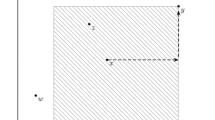Abstract
The paper proposes an explanation to why electoral competition induces parties to state ambiguous platforms even if voters dislike ambiguity. A platform is ambiguous if different voters may interpret it as different policy proposals. An ambiguous platform puts more or less emphasis on alternative policies so that it is more or less easily interpreted as one policy or the other. I suppose that a party can monitor exactly this platform design but cannot target its communications to individuals one by one. Each individual votes according to her understanding of the parties’ platforms but dislikes ambiguity. It is shown that this electoral competition has no Nash equilibrium. Nevertheless its max–min strategies are the optimal strategies of the Downsian game in mixed strategies. Furthermore, if parties behave prudently enough and if the voters aversion to ambiguity is small enough, these strategies do form an equilibrium.
Similar content being viewed by others
References
Alesina A, Cukierman A (1990) The politics of ambiguity. Q J Econ 105:829–850
Aragones E, Neeman Z (2000) Strategic ambiguity in electoral competition. J Theor Polit 12:183–204
Aragones E, Palfrey TR (2002) Mixed equilibria in a Downsian model with a favored candidate. J Econ Theory 103:131–161
Aragones E, Postlewaite A (2002) Ambiguity in election games. Rev Econ Des 7:233–255
Bacharach M (1987) Zero-sum games. In: Milgate M, Newman P (eds) The new palgrave: a dictionary of economics. Macmillan, London
Banks JS,Duggan J, Le BretonM(2002) Bounds formixed strategy equilibria in the spatial model of elections. J Econ Theory 103:88–105
Blais A, Martin P, Nadeau R (1998) Can people explain their own vote? introspective questions as indicator of salience in the 1995 Québec referendum on sovereignty. Qual Quant 32:355–366
Brams SJ, Davis MD (1974) The 3/2’s rule in presidential campaigning. Am Polit Sci Rev 68:113–134
Calvert RL (1986) Models of imperfect information in politics. Fundamentals of pure and applied economics. Harwood Academic Publisher, Chur
Campbell JE (1986) Ambiguity in the issue positions of presidential candidates: a causal analysis. Am J Polit Sci 27:284–293
Carbonell-Nicolau O, Ok EA (2004) Multidimensional income taxation and electoral competition: an equilibrium analysis. Working paper, Rudgers University
DeDonder P (1998) The political economy of redistribution. PhD Thesis, University of Namur
DeDonder P (2000) Majority voting solution concepts and redistributive taxation: survey and simulations. Soc Choice Welf 17:601–627
Downs A (1957) An economic theory of democracy. Harper, New York
Dutta B, Laslier J-F (1999) Comparison functions and choice correspondences. Soc ChoiceWelf 16:513–532
Eichberger J, Kelsey D (2000) Non-additive beliefs and strategic equilibria. Games Econ Behav 30:183–215
Ellsberg D (1961) Risk, ambiguity, and the Savage axioms. Q J Econ 75:643–669
Fishburn PC (1972) Lotteries and social choice. J Econ Theory 5:189–207
Glazer A (1990) The strategy of candidate ambiguity. Am Polit Sci Rev 84:237–241
Haller H (2000) Non-additive beliefs in solvable games. Theory Decis 49:313–338
Kvasov D (2003) Contests with limited ressources. Working paper, Pennsylvania State University
Laffond G, Laslier J-F, Le Breton M (1997) A theorem on symmetric two-player zero-sum games. J Econ Theory 72:426–431
Laffond G, Laslier J-F, Le Breton M (2000) k-player additive extension of two-player zero-sum games, with an application to the Borda electoral competition game. Theory Decis 48:139–137
Laslier J-F (2000) Interpretation of electoral mixed strategies. Soc Choice Welf 17:283–292
Laslier J-F (2002) How two-party competition treats minorities. Rev Econ Des 7:297–307
Laslier J-F, Picard N (2002) Distributive politics and electoral competition. J Econ Theory 103:106–130
Lizzeri A, Persico N (2001) The provision of public goods under alternative electoral incentives. Am Econ Rev 91:225–239
Marinacci M (2000) Ambiguous games. Games Econ Behav 31:191–219
McKelvey RD (1976) Intransitivities in multidimentional voting models and some implication for agenda control. J Econ Theory 12:472–482
McKelvey RD (1980) Ambiguity in spatial models of policy formation. Public Choice 35:385–402
McKelvey RD (1986) Covering, dominance, and institution-free properties of social choice. Am J Polit Sci 30:283–314
Meirovitz A (2005) Informational party primaries and strategic ambiguity. J Theor Polit 17:107–136
Myerson RB (1993) Incentives to cultivate favored minorities under alternative electoral systems. Am Polit Sci Rev 87:856–869
Nash J (1950) Equilibrium points in n-person games. Proc Natl Acad Sci 36:48–49
von Neumann J, Morgenstern O (1944) Theory of games and economic behavior. Princeton University Press, Princeton
Page BI (1976) The theory of political ambiguity. Am Polit Sci Rev 70:742–752
Persico N, Sahuguet N (2002) Campaign spending regulation in a model of redistributive politics. Working paper, Université Libre de Bruxelles
Persson T, Tabellini G (2000) Political economics: explaining economic policy. MIT, Cambridge, MA
Sacks OW (1986) The man who mistook his wife for a hat. Macmillan, London
Shepsle KA (1972) The strategy of ambiguity; uncertainty and electoral competition. Am Polit Sci Rev 66:555–568
Zeckhauser R (1969) Majority rule with lotteries on alternatives. Q J Econ 83:696–703
Author information
Authors and Affiliations
Corresponding author
Rights and permissions
About this article
Cite this article
Laslier, JF. Ambiguity in Electoral Competition. Economics of Governance 7, 195–210 (2006). https://doi.org/10.1007/s10101-005-0003-7
Received:
Accepted:
Published:
Issue Date:
DOI: https://doi.org/10.1007/s10101-005-0003-7




